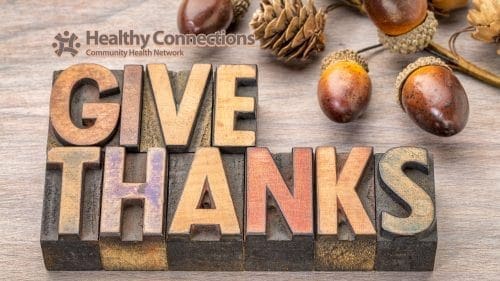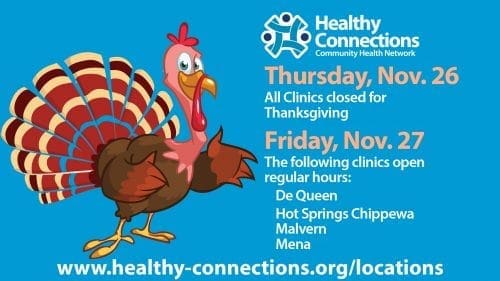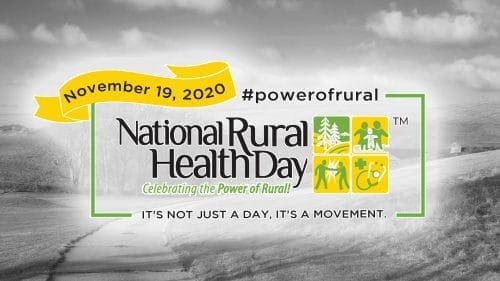 This Thanksgiving Day, we at Healthy Connections give thanks for all of our providers, staff, patients, friends, and families.
This Thanksgiving Day, we at Healthy Connections give thanks for all of our providers, staff, patients, friends, and families.
To celebrate this year, we asked some of our employees what they are thankful for this year.
Family, Friends, Health, Co-Workers, My job, my church, and all the blessings that the Lord continues to give to me daily.
Mena
This year I’m thankful for many things. My family, my job, and my co-workers are just a few. Yes, it has been a rough year for many of us, but we all can look and see good things that have happened as well. Remember to thank those around you for all they do. Also under all these masks, smile!
Mena
I am so thankful for so many things – friends, family, being an American. But I’d like to especially point out that I’m thankful for my co-workers, people who have come together for the purpose of taking care of other, understanding that even with the risks of working in healthcare the benefits of helping others outweigh those risks. Happy, happy Thanksgiving to my HCI peeps!
Mena
I am thankful that I have such a wonderful work atmosphere where everyone cares about meeting our patient needs. We have something very special here at HCI.
Mount Ida
I am thankful for my Salvation and my Church family, my husband, kids, and family and that they are all healthy and live close, my health, my job, living in a small town where everyone knows everyone and looks after each other, the freedoms we have now in America, Vacations with my husband and family, Pepsi, Sweet Tea, Dressing, Coconut Pie and ziplock baggies.
Malvern
I’m thankful for me and my family staying healthy and well with everything that is going on!
Mena
I am thankful for Latricia Reed & Audra Davidson. They never fail to help me. The Chippewa Clinic has been super informative and the women are amazing.
Hot Springs
Mostly for my salvation, and my God who makes all blessings flow, innumerable to count. The inner joy that carries me through, and the peace that comes from that security. My family, our health, and freedom. Our jobs, my boss, and the amazing dental team. They are an amazing group of people.
Mena
I am thankful for my family (my children) and my work family at HCI! 🙂
Mena
 Special hours are in effect this week for clinics across the Healthy Connections Community Health Network.
Special hours are in effect this week for clinics across the Healthy Connections Community Health Network.
All clinics will be closed on Thursday, November 26, 2020, for Thanksgiving.
The following clinics will be re-open on Friday, November 27 2020:
Health For Life Clinic, Little Rock Franklin, Arkadelphia, Hot Springs Central, and Mount Ida clinics are closed Friday and will re-open at their normal operating hours on Monday, November 30, 2020. See the complete list of clinic locations and hours at www.healthy-connections.org/locations.
HEALTHY CONNECTIONS, INC. JOINS NATIONWIDE OBSERVANCE OF NATIONAL RURAL HEALTH DAY ON NOVEMBER 19, 2020
 Healthy Connections, Inc., is proud to recognize the innovation, quality of care, and dedication of health professionals and volunteers in our community during National Rural Health Day 2020.
Healthy Connections, Inc., is proud to recognize the innovation, quality of care, and dedication of health professionals and volunteers in our community during National Rural Health Day 2020.
National Rural Health Day falls on the third Thursday in November each year and recognizes the efforts of those serving the health needs of an estimated 57 million people across the nation.
“We are proud to recognize our talented team of healthcare workers on National Rural Health Day. They work every day to help keep the communities we serve healthy,” said Tony Calandro, CEO of Healthy Connections, Inc. “Our rural communities are wonderful places to live and work and these small towns are places where people work together to benefit the greater good.”
The Healthy Connections community health network is a federally-qualified health center (FQHC). Healthy Connections and Evolve Behavioral Health both accept Medicaid, ARKids 1st, Medicare, and most private health insurance. There is also a sliding-fee scale for patients without health insurance who qualify. Medicaid patients may be required to switch their primary care provider to Healthy Connections before they can be seen. Learn more about Healthy Connections at www.healthy-connections.org.
A special website (www.PowerofRural.org) has been established for rural health stakeholders to explore a partnership pledge, showcase individuals and organizations selected as 2020 Community Stars, and provide visitors with a variety of tools, including social media posts to help #PowerofRural trend in outlets such as Twitter and Facebook. The website also shares how rural communities across the country will be celebrating National Rural Health Day.
 On this Veterans Day, we want to take a moment to recognize and honor all who served. Happy Veterans Day to our soldiers — both past and present. We owe you our thanks, but more than that, we owe you our freedom.
On this Veterans Day, we want to take a moment to recognize and honor all who served. Happy Veterans Day to our soldiers — both past and present. We owe you our thanks, but more than that, we owe you our freedom.
To all veterans of all branches, thank you for your sacrifice, your bravery, and the example you set for us all. To our soldiers out there, thank you for the risks you take and the sacrifices you make.
And thank you to our numerous Healthy Connections Community Health Network employees who have served our country.
Thank you for your service!
 Healthy Connections joins its Community Health Network communities in honoring the critical role of Nurse Practitioners, who are championing the health of our patients, as part of this year’s annual recognition of National Nurse Practitioner week (NP Week).
Healthy Connections joins its Community Health Network communities in honoring the critical role of Nurse Practitioners, who are championing the health of our patients, as part of this year’s annual recognition of National Nurse Practitioner week (NP Week).
This year’s NP Week theme is “NPs Moving Forward: Today, Tomorrow, Together.” The 2020 commemoration occurs as NPs combat Covid-19 and the nursing community celebrates the International Year of the Nurse and the Midwife, coinciding with the 200th anniversary of Florence Nightengale’s birth.
Healthy Connections utilizes Nurse Practitioners at all of our clinics. They assess patients, order and interpret tests, make diagnoses, and provide treatment — including prescribing medications. Across the state and nation, NPs practice in clinics, hospitals, emergency rooms, urgent care centers, nursing homes, and private practices across the country.
Nurse practitioners blend expertise with an added emphasis on disease prevention and health management, NPs offer a comprehensive perspective to health care. They are the health care providers of choice for millions of people.
Healthy Connections joins the AANP and many others grateful across our communities in recognizing nurse practitioners for their leadership, putting the health of patients ahead of their own. This National Nurse Practitioner Week, we salute you.
[our-team columns=”4″ group=”APRN”]
 Maureen Keese, who was a devoted and cherished Board of Directors member for Healthy Connections, Inc., passed away this week. Maureen dearly loved our organization and mission and much of what we are today, and what we are trying to become, is a tribute to her and the work she did with our board over the past eight years.
Maureen Keese, who was a devoted and cherished Board of Directors member for Healthy Connections, Inc., passed away this week. Maureen dearly loved our organization and mission and much of what we are today, and what we are trying to become, is a tribute to her and the work she did with our board over the past eight years.
“Maureen Keese was an amazing individual who helped so many in the community. She will be seriously missed and leaves a huge void,” said Healthy Connections CEO Tony Calandro. “She was one of our strongest supporters and biggest advocates and we will miss her presence within our Healthy Connections family.”
Maureen grew up in Newark, N.J., and attended Rutgers University before moving to California. She earned degrees from California State University Long Beach, Pepperdine University, and Azusa Pacific University, and began a career in education. In 2003, she and husband Dr. Hector Costamagna relocated to Arkansas. She began work at the University of Arkansas-Rich Mountain where she served as Director of Lifelong Learning and Program Development.
She joined the Healthy Connections, Inc., Board of Directors in 2012 to complete the term of a departing member. She stayed on for two additional terms on the board. Her experience in education, and healthcare marketing and administration, gave her a unique perspective in working to improve the quality of healthcare offered to our communities.
“What we had with Maureen was the epitome of an interested, enthusiastic volunteer. She served admirably, trying to make a difference in our community – both as a volunteer at Healthy Connections and through her job at UA-Rich Mountain,” said Derwood Brett, Chairman of the Healthy Connections Board of Directors. “We added several clinics when she was on the board. She never lost her excitement to make a difference. We are going to miss her.”
Maureen Keese was 69-years-old.
 This Thanksgiving Day, we at Healthy Connections give thanks for all of our providers, staff, patients, friends, and families.
This Thanksgiving Day, we at Healthy Connections give thanks for all of our providers, staff, patients, friends, and families.



 Special hours are in effect this week for clinics across the Healthy Connections Community Health Network.
Special hours are in effect this week for clinics across the Healthy Connections Community Health Network. Healthy Connections, Inc., is proud to recognize the innovation, quality of care, and dedication of health professionals and volunteers in our community during National Rural Health Day 2020.
Healthy Connections, Inc., is proud to recognize the innovation, quality of care, and dedication of health professionals and volunteers in our community during National Rural Health Day 2020. On this Veterans Day, we want to take a moment to recognize and honor all who served. Happy Veterans Day to our soldiers — both past and present. We owe you our thanks, but more than that, we owe you our freedom.
On this Veterans Day, we want to take a moment to recognize and honor all who served. Happy Veterans Day to our soldiers — both past and present. We owe you our thanks, but more than that, we owe you our freedom. Healthy Connections joins its Community Health Network communities in honoring the critical role of Nurse Practitioners, who are championing the health of our patients, as part of this year’s annual recognition of National Nurse Practitioner week (NP Week).
Healthy Connections joins its Community Health Network communities in honoring the critical role of Nurse Practitioners, who are championing the health of our patients, as part of this year’s annual recognition of National Nurse Practitioner week (NP Week). Maureen Keese, who was a devoted and cherished Board of Directors member for Healthy Connections, Inc., passed away this week. Maureen dearly loved our organization and mission and much of what we are today, and what we are trying to become, is a tribute to her and the work she did with our board over the past eight years.
Maureen Keese, who was a devoted and cherished Board of Directors member for Healthy Connections, Inc., passed away this week. Maureen dearly loved our organization and mission and much of what we are today, and what we are trying to become, is a tribute to her and the work she did with our board over the past eight years.